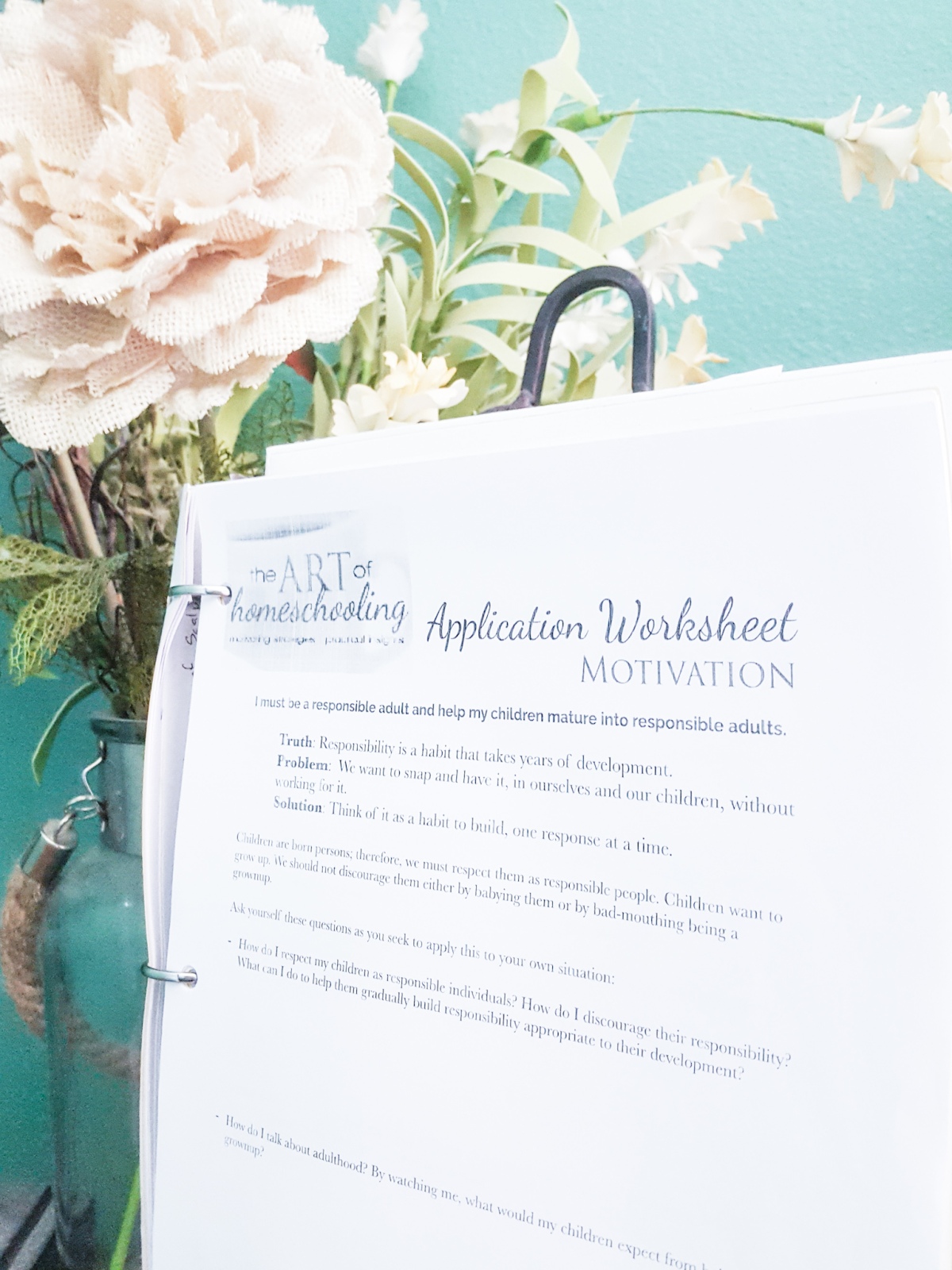This is the second post in a two-part series “Art of Homeschooling.” These notes represent ideas I had for implementing the principles taught in Mystie Winckler’s e-course. You can read the first part here.
Connecting with my Children/Starting the Day Off Right
Our daily schedule looks something like this: We get up, we eat, we do chores, then if I am still busy with chores the kids play or do other activities till it’s time for school. After school they may play. In the afternoons they have quiet time and work on school assignments; after supper in the evening they
play, we read together, etc.
GOALS:
I think I need to stay on top of their time between eating breakfast and starting school; they could be more productive and efficient except that I am distracted and not doing as much directing.
Make sure they are staying busy with chores and not piddling.
If they have free time, channel it properly (suggest exercise outdoors, take a nature walk, or give them an assignment indoors—puzzle, coloring, art, reading, etc.). Help them to see that this time in the morning is already planned and we are just to work through it steadily together.
Teach them to come to me after they complete each assignment. Their day is not their own till after school.
The daily habit I can practice in order to affectionately connect with my children each day is to greet them warmly in the morning with a smile and a hug, and (if I have time the evening before) to write them a “love letter” in their journal.
Laughter throughout the day is another good connection. And when there is time for it, extra fun, games, crafts, and reading. School should not be the only time I spend with them intentionally and meaningfully.
In order to help us be on the same team, working toward the same goals, we can start our day by hugging, holding hands, discussing the plan, and cheerfully encouraging one another to complete it
well. Make eye contact and commend them for something. Notice when they are working together and working well and commend them.
Motivation and Responsibility
I discourage the children’s responsibility by not staying on top of what is happening. If it’s okay for them to just putter out and off and do their own thing while I am busy, I am not requiring responsibility. I’m making it too easy for them to be irresponsible.
The kids are most prone to dawdling in the morning before school, and then sometimes during school (if distracted by something else going on). I don’t detect any specific motivation other than wanting to do whatever is “fun” or “interesting” at the moment.
I am most prone to dawdling in the morning before chores, and in the evening after supper (when I should be doing chores or could be spending time with the kids).
GOALS:
For me, first steps in our home will mean I must have them give an accounting regularly. If I give a directive, I must come back and see that it is followed. I must check their progress and their work. There will have to be a lot of hand-holding at the beginning.
If there is something to do that can be done by one of them, rather than shouldering the brunt of the work myself I should mete out more to to them in age-appropriate segments. I should not clean up after them, or let responsibilities I have assigned to them “slide.”
I tell them being an adult is a lot of work and responsibility. I should also express to them that there is joy/reward attached to that responsibility when carried out well.
I “check out” too often with Facebook or something else I can use as a distraction when I’m feeling unmotivated or overwhelmed. Rather than catch me doing this, they should see me cheerfully plugging along with a song, fulfilling my responsibilities without complaint or irritation. Limit internet
time in morning to a few minutes. NO internet in evening till kids are in their room.
When Cliff asks me to do something I need to be sure I fulfill it right away, setting an example for those under my authority.
Talk about the results of dawdling versus diligence. The natural consequences that result from
dawdling include not getting to have time later to do things we enjoy doing because our tardiness put us
behind and wasted our time that could have later been spent at (guilt-free) leisure. Dawdling goes against what we know is right, and so we sin against our conscience. It steals our leisure time, makes our chores and responsibilities more difficult, and makes us less appreciative of our free time.
Dawdling/laziness does not glorify God. Diligence gives us a good conscience. It permits us to have leisure time when the work is done. And that time can be fully enjoyed, guilt-free.
Persistence and Faithfulness
The feelings most likely to drive me off course are feelings of frustration with how the day is going, and anger and irritability when the kids (or circumstances) aren’t cooperating. Bickering kids, unexpected interruptions, extra work, etc. trigger these feelings.
I am most critical of myself when I am lazy or angry. I am most critical of my children when they are lazy, angry, or rowdy.
GOALS:
How can I respond? Remind myself of what a successful day really looks like: faithfulness. Fruitfulness, rather than perfection.
Attending to the needs of my children in all areas—physical, spiritual, in admonition, discipline, love, training, laughter and good will—is more important than completing a to-do checklist like math, spelling, and laundry. Seeking to worship Christ when a curveball is thrown in my day is worth more than dusted furniture and completed math pages.
I need persistence when the day doesn’t go as planned and I get thrown a lot of extra stuff. Then I’m tempted to give up because I’ve been set back. It was like having the goal in sight and then having someone move the marker while you’re running on the track. I can choose a calm, intentional response by examining my list to see if everything really must be done or if I’m being a perfectionist, then choosing to do the things that are truly a priority with a good attitude—even if it cuts into my “free time.”
I need to learn to have greater flexibility—and that comes by relinquishing control to God rather
than trying to keep a tight fist on it myself.
The feelings most likely to disturb Brianna and Marcus: anger, boredom, frustration. Anger, when they have a conflict together, or when they have been disobedient and require correction. Boredom, when they are confronted with the daily grind of school and chores. Frustration, when they feel overwhelmed by their work or feel like they can’t do a good job with it.
I can help them calm down and learn self-discipline by:
• Learning to stay calm, be cheerful, and be self-disciplined myself
• Teaching them truths about God, themselves, and life (motivate in proper ways; teach Scripture and life truths; give admonition and correction when needed)
• Doing what I can to help them avoid/redirect them from unnecessarily tense and frustrating situations (oversee their work together instead of leaving them alone; designate responsibilities when I am busy and cannot help them; give the right amount of help and encouragement at the right time)
I can trade harshness for humor by bringing the kids to the couch for a talk, ending with tickling/joking so we may leave in good humor.
One specific area the kids and I can practice persistence in together is Bible time. We will start there. We will try to be faithful with devotions every day, not just school days.
* * *
What habits have helped you motivate yourself and children, Mamas?



